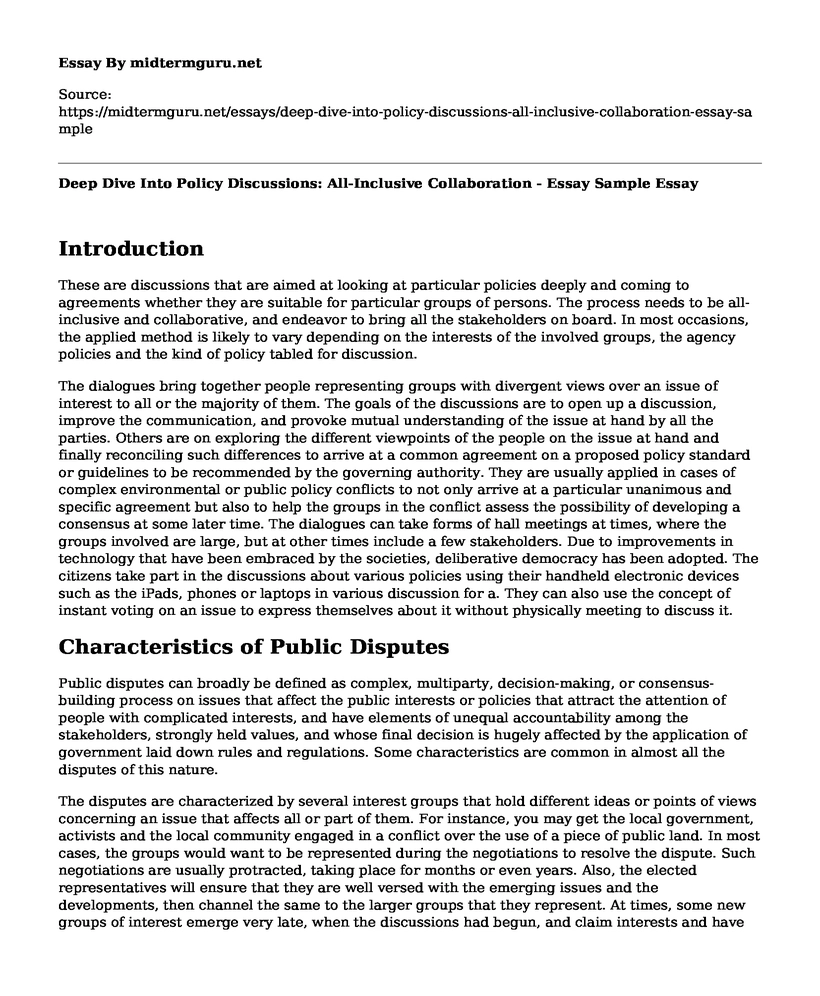Introduction
These are discussions that are aimed at looking at particular policies deeply and coming to agreements whether they are suitable for particular groups of persons. The process needs to be all-inclusive and collaborative, and endeavor to bring all the stakeholders on board. In most occasions, the applied method is likely to vary depending on the interests of the involved groups, the agency policies and the kind of policy tabled for discussion.
The dialogues bring together people representing groups with divergent views over an issue of interest to all or the majority of them. The goals of the discussions are to open up a discussion, improve the communication, and provoke mutual understanding of the issue at hand by all the parties. Others are on exploring the different viewpoints of the people on the issue at hand and finally reconciling such differences to arrive at a common agreement on a proposed policy standard or guidelines to be recommended by the governing authority. They are usually applied in cases of complex environmental or public policy conflicts to not only arrive at a particular unanimous and specific agreement but also to help the groups in the conflict assess the possibility of developing a consensus at some later time. The dialogues can take forms of hall meetings at times, where the groups involved are large, but at other times include a few stakeholders. Due to improvements in technology that have been embraced by the societies, deliberative democracy has been adopted. The citizens take part in the discussions about various policies using their handheld electronic devices such as the iPads, phones or laptops in various discussion for a. They can also use the concept of instant voting on an issue to express themselves about it without physically meeting to discuss it.
Characteristics of Public Disputes
Public disputes can broadly be defined as complex, multiparty, decision-making, or consensus-building process on issues that affect the public interests or policies that attract the attention of people with complicated interests, and have elements of unequal accountability among the stakeholders, strongly held values, and whose final decision is hugely affected by the application of government laid down rules and regulations. Some characteristics are common in almost all the disputes of this nature.
The disputes are characterized by several interest groups that hold different ideas or points of views concerning an issue that affects all or part of them. For instance, you may get the local government, activists and the local community engaged in a conflict over the use of a piece of public land. In most cases, the groups would want to be represented during the negotiations to resolve the dispute. Such negotiations are usually protracted, taking place for months or even years. Also, the elected representatives will ensure that they are well versed with the emerging issues and the developments, then channel the same to the larger groups that they represent. At times, some new groups of interest emerge very late, when the discussions had begun, and claim interests and have to be accommodated as well. However, in some disputes, the interested parties will come together only once or on a few occasions, and never to meet again, while other cases involve repeated meetings whether at the same time of conflict or later in time to keep each other updated on the measures taken towards resolving the issue such as in cases of race riots. To conclude, the rules set to govern the resolution of public problems are usually set by government agencies. They must follow certain hierarchies, with the factors relating to the personal and community identities at play. Therefore, the processes are usually complicated and require collaborative management skills.
Cite this page
Deep Dive Into Policy Discussions: All-Inclusive Collaboration - Essay Sample. (2023, Jan 05). Retrieved from https://midtermguru.com/essays/deep-dive-into-policy-discussions-all-inclusive-collaboration-essay-sample
If you are the original author of this essay and no longer wish to have it published on the midtermguru.com website, please click below to request its removal:
- Essay on the Role of Musicians in Modern Society
- Essay on Nonverbal Communication During the Negotiation Process
- Paper Example on Sustainable Development and Leadership in Nigeria
- Research Paper on International Relation: War Between the U.S. And North Korea
- Essay Sample on the Great Depression
- Shift Supervisor Struggles: Low Morale, Pressure, Absenteeism - Essay Sample
- Unveiling Paul's Teachings on Marriage and Immorality in the Pastoral Epistles - Essay Sample







